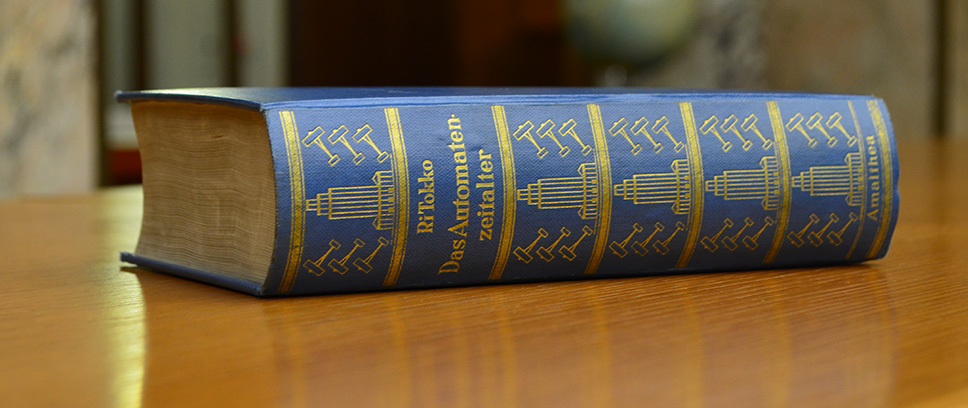
“The present time is imbued with the future” – A look back and a look ahead
Reading tips for long winter evenings by Dr. Matthias Miller| 13 December 2023
You can’t start early enough to look for Christmas gifts, which is why I recently – bearing in mind the famous Leibniz quote – headed off to the bookshop. It was the Saturday after Black Friday, which had sloshed over here from the USA. Interesting, I thought: all the shops are offering whopping sales except the bookshop, due to the fixed prices on books in Germany, but it was nevertheless jam-packed, almost fuller than the other stores. After I had already filled up my shopping basket with novels, I arrived at the history section. And there I could hardly believe my eyes: big fat and fattest books, almost nothing under a thousand pages.

The first work I noticed was “Frühling der Revolution. Europa 1848/49 und der Kampf für eine neue Welt” (DVA 2023), the German translation of Christopher Clark’s latest work “Revolutionary Spring: Fighting for a New World 1848-1849” (Penguin Books, 2022), comprising 1,168 pages and no doubt exhausting the topic for many years to come. In Deutschlandfunk on 21 October 2023 , however, Florian Felix Weyh characterised Clark as “stricken by a fear of shortening”, and other reviewers also criticised the amount of material and the concurrency of numerous passages that were often perceived as secondary topics, making the book unnecessarily convoluted. Yet those who are familiar with Clark as an author know that he writes in an enthralling way and captures the reader’s attention through the wealth of detail.

Right next to it was a further “brick”: “Weltenbrand. Der große imperiale Krieg 1931–1945” (Rowohlt 2023), the German translation of “Blood and Ruins: The Great Imperial War, 1931-1945” (Allen Lane 2021) by Richard Overy. There are many books about the Second World War, but Overy’s work covers an unusual period of time in that he begins with the invasion of China by Japan in 1931, placing greater emphasis on the global aspect of the world war than most historians usually do. In this way his work is more like a world history of imperialism than a mere narrative of the events of the war in Europe. The book has 1,520 pages and weighs 1.7 kg – another reason why it doesn’t exactly lend itself to bedtime reading.
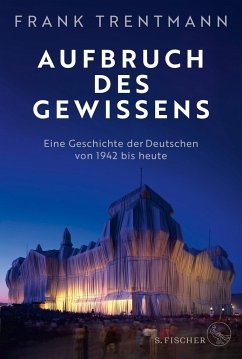
Like a sequel to Overy, Frank Trentmann’s “Aufbruch des Gewissens. Eine Geschichte der Deutschen von 1942 bis heute” (S. Fischer 2023), the German version of his history book “Out of the Darkness. The Germans, 1942–1992” (Penguin 2023), is quite literally a weighty work. With its 1,036 pages, just under the limit, it takes Stalingrad as a turning point in the Second World War to relate the history of Germany up to the present. It is not just a list of dates and facts, instead presenting a history of German mentality from the Shoah and the end of the war, through the “economic miracle” in West Germany, and on to the ’68 generation and the reunification, whereby the question of guilt, morality and remembrance is always in the foreground. That Germany had already become a country of immigration was not politically recognised for a long time, nor was it admitted that the victims of the Holocaust had failed to receive the necessary acknowledgement. Of central importance in Germany after the reunification were the questions of how to deal with authoritarian states and the ambivalent moral compass with regard to the environmental movement, not to mention the recent debates about migration.
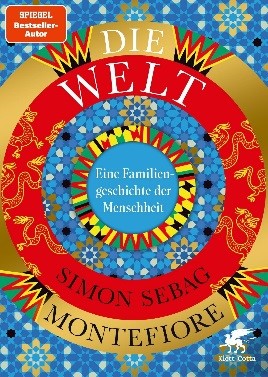
And then “Die Welt. Eine Familiengeschichte der Menschheit” by Simon Sebag Montefiore (Klett-Cotta 2023), a translation of his ambitious work “The World: A Family History of Humanity” (2022), almost caused the book table to collapse. With 1,536 pages and at least 2.1 kg, the volume cannot be described as easy reading, alone for the fact that it required six translators to complete the German translation. The arc of the history of humanity, which is told as family (hi)stories, stretches from the Nubians, via the Ottomans, Habsburgians and Romanovs, to the Trumps and Putins of our day. I don’t want to judge whether all that is relevant and correct, but it seems inevitable that Netflix will one day avail itself of the family stories.

When the bottom of my shopping basket almost fell out under the burden of 5,260 pages or 6.5 kg of books, I thought: Enough history, now it’s time for the future! At first “2084. Das Ende der Welt” (Merlin Verlag 2016) by the Algerian writer Boualem Sansal, a translation of “2084: La fin du monde” (2015), caught my attention. With reference to Orwell’s novel “1984”, the author describes a totalitarian state based on religion that disavows its past. Individualisation and gullible trust in the system are factors that maintain the state. Nonbelievers and renegades are held in a ghetto, a sombre scenario that once again has greater chances of becoming reality.
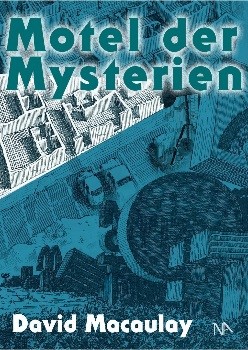
David Macaulay, the venerable master of illustrated history books (the older readers among us will remember his first book “Cathedral” from 1973), now offers the graphic novel “Das Motel der Mysterien” (Nünnerich-Asmus Verlag 2018), an updated version of his early work “Motel of the Mysteries” (1979). After a catastrophe in the year 2018, the USA has perished and its buildings and remains are buried under a thick covering. An archaeologist of the fifth millennium uncovers a hidden burial chamber in which two people have evidently been ritually interred. One lies on a “ceremonial bed”, the other in an open porcelain sarcophagus in a separate chamber. With a wink of the eye, Macaulay tells how in the year 4018 the archaeologist interprets these finds and pieces together a picture of life in the 21st century.
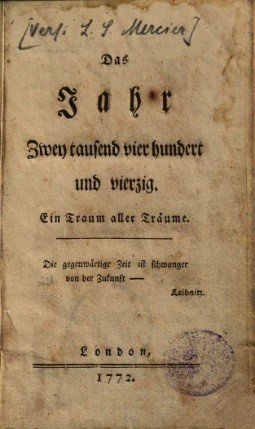
In a box with second-hand books I discovered two classics. The first, “Das Jahr 2440. Ein Traum aller Träume” (Suhrkamp 1989) by Louis-Sébastien Mercier, has nothing to do with Sansal’s “2048”, because it was written in a completely different situation. It appeared as “L’an 2440, rêve s’il en fut jamais” in France in 1772 during the period of Absolutism. The protagonist falls asleep in the year 1769 and wakes up in Paris in 2440, where, after a peaceful revolution, a social and reasonable polity has established itself. Taxes have been abolished and tobacco eliminated, unfortunately unlike today. But who knows? Maybe in 2440.
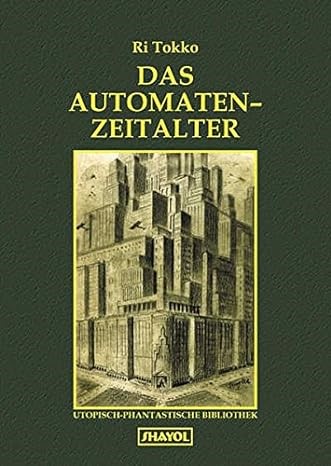
The second antiquarian classic: With “Das Automatenzeitalter. Ein prognostischer Roman” (Amalthea-Verlag 1931, new edition Shayol 2004), Ri Tokko, the alias of the author Ludwig Dexheimer, published a visionary work in the field of futurology. On 900 pages, almost competing with the above mentioned history books, this “prognostic novel” from the “Age of Automats” describes a plethora of detailed predictions for the year 2500, including a social infrastructure oriented on ecological conditions, the influence of CO2 emissions on the climate, rapid transit railways connecting continents, and a society in which it is possible for individuals to access a collection of films and books on microfilm. He also predicts the cloning of people and the use of hormone preparations for contraception. For the time around 1930 this seemed highly futuristic and at the same time frightfully realistic. On 31 December 1938 the Nazi “Reich Literature Chamber” placed the book on the “list of harmful and undesirable literature”, thus in effect banning it. For anyone who is unable to get hold of a second-hand copy, the book has recently become available in the reading room of the DHM Library.
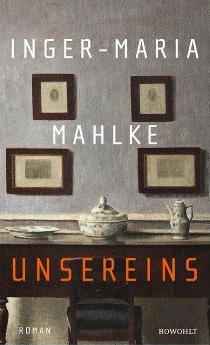
Should all this be too much history and futurism for anyone, please allow me to recommend “Unsereins” by Inger-Maria Mahlke (Rowohlt 2023), which focuses on the Lindhorst family in Lübeck. It is no accident that the image of Lübeck society in the late 19th and early 20th century and the ramifications of Lindhorsts resembles another work about a famous Lübecker family published by the town’s most famous son in a two-volume novel in 1901, for which the author received the Nobel Prize in Literature. We will have to wait to see whether Malke will ever gain the same honour.
|
|
Dr. Matthias MillerDr. Matthias Miller is Keeper of the Library – Curator of Manuscripts Old and Valuable Books at the Deutsches Historisches Museum. |
